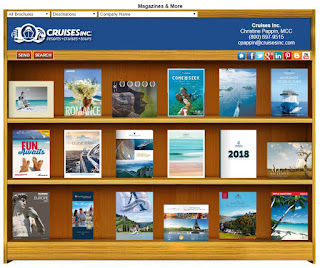Today marks the 30th anniversary
of the World Wide Web
You are fast asleep and all of a sudden you decide to see what cruise ships are sailing to Aruba next month. OK, so you weren't fast asleep after-all. Nevertheless, you get out of bed and grab your cell phone or turn on your PC.
Picking from your browser favorites you pull up your favorite search engine and fill in a few options and there you have it a list of several cruises to choose from. You narrow your selection to several on one of the cruise lines. Next, you want to learn more about the ship so you select their brochure from the website's brochure rack and begin navigating the pages.
Next you put together a request for a price quote to your travel agent, via their website, or through your email client. Now, finally, you can go back to bed dreaming about sunny days laying by the pool or beach with a drink in your hand. All this without human intervention. Of course, you have several questions for your professional travel planner, but that can wait until morning.
Life Before WWW
Onboard Ships
Passengers want to stay connected to friends, family, and possibly work while on their cruise. The cruise lines have responded, with improvements to their networks. Most lines offer a variety of options so that every passenger can be accommodated based on their requirements. Not all passengers need streaming video for example, so those that do, pay a premium price to get that option.
Network speeds have improved, but there is still a ways to go in most cases. Even so, with unlimited packages, at least passengers now have a fixed cost option should they wish to access the internet onboard the ship. Whether you used your personal PC, tablet, phone, or ship's devices, you can stay connected to the internet throughout your voyage if you desire.
Prior to the days of the WorldWideWeb, this same desire for information would have had to wait until morning, unless you already had hard-copy brochures for the various cruise lines. You would have then made a phone call or visited your local travel planner who would probably have had to take some time to do some research.
You may have been able to fall asleep dreaming about Aruba, but you wouldn't have known whether you could be going there next month.
Nowadays, you can enjoy instant (as fast as your internet speed) information, tailored to your specific needs. Even if you are mobile, as long as you have an internet connection, there isn't any waiting for information.
This is only one way that the WorldWideWeb has impacted the Cruise Industry. With technology advancements, it's possible to stay connected even while sitting by the pool sailing in the middle of the ocean. This need for connectivity has spurred upgrades on most of the cruise ships afloat today.
We've covered that topic in past articles on our blog.
Onboard Ships
Passengers want to stay connected to friends, family, and possibly work while on their cruise. The cruise lines have responded, with improvements to their networks. Most lines offer a variety of options so that every passenger can be accommodated based on their requirements. Not all passengers need streaming video for example, so those that do, pay a premium price to get that option.
Network speeds have improved, but there is still a ways to go in most cases. Even so, with unlimited packages, at least passengers now have a fixed cost option should they wish to access the internet onboard the ship. Whether you used your personal PC, tablet, phone, or ship's devices, you can stay connected to the internet throughout your voyage if you desire.
Join Us for a Fun Hour on Twitter Wednesday Nights





No comments:
Post a Comment